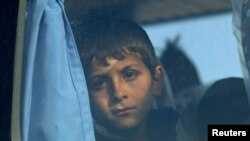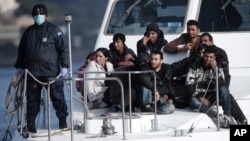A ship that lost power in the Mediterranean Sea with 700 migrants aboard was towed into a Greek harbor Thursday, days after the European Union’s asylum and migration policy drew stinging criticism from Pope Francis.
It took the Greek navy four days to tow the ship Baris from international waters into Ierapetra harbor, on the Greek island of Crete. The vessel lost power in storm-force winds.
The migrants on the ship were exhausted, terrified, but safe. They were being housed in a basketball arena while their refugee status was assessed. Many are Syrians fleeing the civil war. A senior health official on the island, Panayiotis Efstathiou, said many would be released.
“There are two groups of migrants,” he said. “The Syrians, in line with the guidelines from the United Nations, will be released after being verified, as they are considered refugees.”
According to European Union rules, the migrants must stay in the country where they first arrive until their asylum claims are assessed.
In the capital, Athens, some 150 Syrian migrants began a hunger strike outside the parliament building Monday. Most paid about $5,000 to smugglers to reach Europe and have nothing left.
Ammar, 22, said he fled Aleppo, in Syria, after his father was killed and his brother jailed.
“We don't have legal papers, we can't rent a house, we can't do anything," he said. "So we have to deal with the mafia, and have to pay at least, for one person, in one bed, for one month, 100 euros [$110].”
Andrej Mahecic of the U.N. High Commissioner for Refugees said that while conflicts in places like Afghanistan and Syria grind on, the refugees will keep coming. He said Europe must deal with the influx.
The refugees need not only to be rescued but also to be given a proper reception, he said, adding, "It is also important to understand that this is not just the responsibility of the state where these people disembark and there needs to be a more concerted effort.”
Pope Francis made a similar point Tuesday, criticizing Europe’s response to the migrant crisis during a speech to the EU Parliament in Strasbourg, France.
The pontiff said the absence of mutual support within the European Union risks encouraging particularistic solutions to the problem — solutions, he said, that fail to take into account the human dignity of immigrants, and thus contribute to slave labor and continuing social tensions.
The strength of Francis' comments surprised many EU lawmakers and added to the growing chorus of demands for reform of Europe’s asylum policy.







